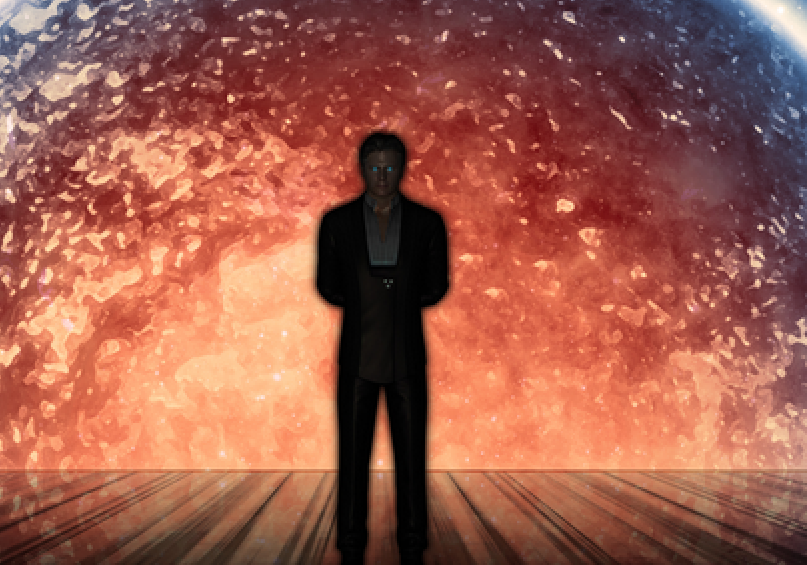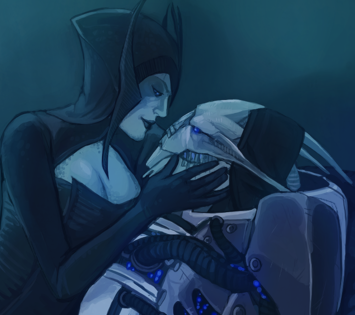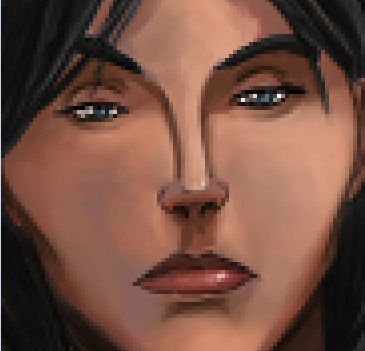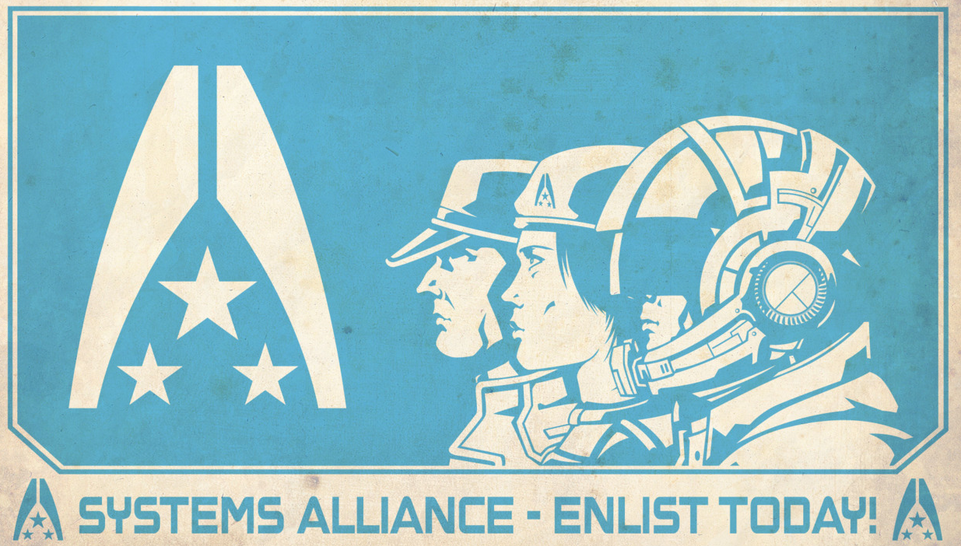Our place in the universe is more fragile than we’d like to think.
There are many interesting, multifaceted characters in the ME Canon Universe. But none of them are as nuanced, as difficult to actually transform from merely parroting words into a fresh new take, as the Illusive Man.
When we first meet the Illusive Man in ME 2, he seems confident, knowledgeable and powerful. His most basic precept never wavers — that humanity should be the dominant power in the galaxy. His belief in this is absolute, overriding all other considerations — in canon, it drove him to nearly destroying the galaxy with his mad plans.
But this certainty is not part of what it means to be Jack Harper. That’s merely a goal. You can still have TIM be TIM, regardless of his ultimate goals, as long as they they are bigger than one human man could normally achieve.
The Personality of ol’ Blue Eyes
Salvation comes with a cost. Judge us not by our methods, but by what we seek to accomplish.
When taken in series, a few observations can be taken away from TIM, both from his in-game speech and the Shadow Broker’s files.
- He is supremely confident, yet never reckless. As a leader, he focuses on leading by inspiring confidence, by gathering together those who can use the resources, tools, and intelligence he gathers to complete goals. But he never risks himself in these ventures, always staying back, out of sight. TIM should never be used as a physically aggressive character, even if he has been one in the past and is certainly capable of it. He sees himself as both beyond and above such things now.
- He comes across as emotionally cold, often with a neutral expression that betrays nothing except occasional condescension, irritation, or slight amusement. Yet he is clearly capable, during the comic, of many strong emotions — love, hate, fear, sorrow, despair. Whatever has happened to TIM, his emotions are damaged. He can still feel love, but he chooses to believe he can’t. He sees himself as immune to emotional damage like that he took when Ben and Eva died if he simply doesn’t care about people , instead only becoming passionate about objectives and end results.
- TIM surrounds himself with mystery. From his demeanor to his location, from whatever his real goals are to his effortless mastery of almost any situation, he never lets any truly understand all of him. He perfectly embodies that Art of War’s stricture about being chaos, for one cannot predict the wind.
- Perhaps most critically, TIM embodies an aspect of humanity. If Shepard embodies humanity’s heart and spirit, then TIM represents humanity’s intellect. He is reflective, yet determined to see through his goals to the end. He is never reactive, always seeking to control the pieces on the board. Even when at bay or thwarted, he never lets his anger get the best of him, always thinking of a new way to proceed.
Taking this into consideration, in my AU Jack Harper’s personality is much the same as in canon, with several modifications.
Many people start off with the old canard that “TIM hates aliens”. Even in canon, this isn’t true. TIM hates turians, sure, but given what he went through on Shanxi, this is hardly surprising. But even in canon, he is complementary and impressed by Mordin Solus, agreeable to the concept of enlisting a mostly-alien crew for the fight against the Collectors, and based on what the Shadow Broker wrote, banging an asari matriarch.
TIM does not strike me as the kind to engage in that level of hypocrisy, thus he never hated aliens. He hated the idea that humanity would be subjugated by aliens, much as the krogan and quarians have been. He hated that aliens dominated the galaxy and yet gave humanity no room to share in the wealth.
Another person who did an analysis of TIM summed it up thus:
He felt that the human race had done everything it needed to do to earn a firm place within the galaxy. When they still were faced with hardship and an uncaring Council, Cerberus stepped in to ensure that this would be changed. If the humans wouldn’t be welcomes, they would make themselves be welcomed.
Thus, a great deal of his personality can be driven by his outlook on the nature of how humanity interacts with the galaxy, and more importantly, how they are treated.
Goals and motivations
Cerberus isn’t just an organization or the people behind it. Cerberus is an idea. That idea is not so easily destroyed
In canon, we are given a pleortha of motivations and goals for TIM, but they all boil down to one thing:
He feels humanity is at least as good, if not better, than the aliens. In my AU, this doesn’t change. What changes are his ultimate goals.
In Canon, he felt that aliens would never accept humans as equals, mainly because most of them seemed blind to anything but their own internal squabbling. The sheer focused idiocy of the Citadel Council makes one question if he’s all that wrong that humans are superior. The only way he sees being able to safeguard humanity is through outright human dominance. Unfortunately, the only path to dominance is over the broken corpses of those already atop the galactic heap, but the gap between human might and the aliens is narrow enough that, if he’s careful and cunning, he can be the push to put Earth on top.
His canon goals are simple and ugly:
- Ensure humanity is the dominant military, economic, scientific, and covert power in the galaxy
- Kill or at least cripple alien races that provide a current or future threat to humanity.
- Steal or otherwise acquire alien technology and abilities that could enhance humanity
- Build some form of shock-attrition army (geth, creepers, rachni, or eventually indoctrinated humans) that are superior to all other races’ military forces to aid in suppression.
- Sabotage alien economies, disrupt political movements, and prevent anyone from coming to power in the SA that would seriously opposes him
- Infiltrate all levels of SA governance and acquire military technology of a level to allow Cerberus to act as a ‘third flank’ for conventional human forces
- Eventually, reduce all other aliens to either subservience or outright slavery, to ensure human dominance never fades.
This list sounds like the goals of, at best, a monomaniacal dictator, and at worst a sociopath. They end up doing nothing to strengthen humanity, and in the end TIM’s entire rationale is defeated by indoctrination, bad aim, and a pistol. Pathetic.
In my AU, however, he is equally convinced that, while some aliens may tolerate humanity being on par with them, they would never accept humanity as superiors. The technological, financial and military gulf between humanity and aliens is so vast that the SA resorts to sickening, Cerberus-like actions to bolster their strength, and the aliens themselves commit atrocities that would impress the Dark Eldar of Warhammer 40k. In this environment, humanity pushing for supremacy is not only mind-bogglingly unrealistic, but likely to simply unite the other aliens into an assault on humanity.
His goals are thus much more … demure.
- Ensure humans have an equal voice in galactic society, with enough respect to inspire partnerships, and enough fear to prevent conquest.
- Ensure humans eventually break free of the confines of the current SA government before humanity becomes as corrupted, power-hungry and wretched as the salarians and asari.
- Ensure humans are not subsumed into another culture, such as the asari, or flung into suppressive exile, like the batarians and quarians
- Push forward human technology, economic might and knowledge so that humanity isn’t dependant on technical handouts, financial aid and alien ‘advisers’.
The goals are at least achievable, and do not end up uniting the galaxy against humanity out of self-defense or outrage. Furthermore, UNLIKE the canon goals, they allow him to stay in the background and work from the shadows, which is one of his core personality points.
Methodologies and tools
Information is my weapon, Shepard.
The Illusive Man does not rely on, in my AU, the massive use of force. He prefers to use three things that are often much more effective — intelligence gathering, economic manipulation, and disruptive technology.
TIM rarely needs to resort to direct violence, and when he does it is very surgical — he relies on a pair of supremely skilled and very dangerous assassins, Pel and Kai Leng. Both were (in the AU) contemporaries of such figures as Anderson, Ahern, and Preston Kyle, and as such have abiltiies on par with them.
But he only uses violence when other methods have failed, and never before they have at least been tried.
His greatest ability is information. His network of spies and information brokers rarely if ever even know they are reporting to him, and many are aliens. He has contacts at every level of human society, allies who would rather die than betray him, and a reach that even the Shadow Broker or STG can’t match. He has deals with powerful figures — the salarian crime boss Edat Valern, with Aria, with the turian shadow-master known as P. , and with many disaffected officers of the human AIS. He even has a couple of Commissariat contacts with faulty conditioning allowing them to work for him.
His network is only half his power, though — his mind allows him to sift through data and make instinctual connections instantly. His ‘upgrades’ at the hand of the Arca Device didn’t indoctrinate him, but they did affect him, letting him translate all alien languages as well as literally decrypt things by merely looking at the patterns.
Added to this is his vast wealth, which is only augmented of that of his allies — Henry Lawson with his billions, the Ashlands and Eldfells, who are the wealthiest humans in the galaxy, smaller groups who support humanity’s independence, even his asari partner , Trellani. Added together, Jack Harper can move more money than the entirety of the Noveria Development Corporation, and he is a master at making investments to not only allow it to grow but find more influence in corporations.
His reach and influence allow him wide access to a staggering array of technologies. Rather than pick the most potent, he often selects and invests in things others have written off. He was one of the primary investors in volus missile research that lead to the development of the modern M/AM matrix missile — which the volus of course sold to humanity, boosting it’s combat power. Many of the science initiatives he (and not the rest of Old Cerberus) is responsible for are researches into communications, stealth, encryption, VI-driven combat, and AI.
He is aided in this later on (in my version of ME2) by acquiring a very potent ally with technology beyond the asari or salarian abilities, which he uses sparingly but with good effect.
This ties into Jack never getting involved. He prefers his operations to be like him — in the shadows, dealing with issues at arms length, and never facing exposure or danger directly.
Final Thoughts
You think because I’m willing to use the enemy’s tactics, they’re no longer my enemy?
TIM’s ultimate fate in my version of ME3 is different than canon, both due to the fact that my ending is vastly different and because he’s not a goddamned idiot this time around.
At the end of the day, though, some things remain the same. If the choice is decency or humanity, TIM will always choose the latter. If the choice is between keeping the Reapers around to prevent something worse from happening to the Galaxy, or destroying them and gambling humanity’s future on the unknown, TIM will take the safer bet. While he does not betray Shepard the way Canon TIM does, and certainly never gets indoctrinated, the ending I have planned highlights how TIM is different from Shepard — any Shepard.
Jack Harper sees himself as a catalyst of change, a bridge between an uncertain dangerous present and a bright, shining future for humanity. No intepreation of him should ever alter his fundamental belief that he, and only he, is the one who has the answers to save everyone, be it to lead them to dominance or to survival.
Every Shepard, from all three canon backgrounds and all three canon life events, and from every fanfic Ive read, doubts themselves at some point. They see themselves as a savior, or a protector, or a predator, or merely a clean-up man — some are saints, others criminals. But they all wonder and doubt if they’re good enough, if they have made the right choices, if the decisions they have now committed to will work.
Jack Harper never doubts himself. Not even once.





